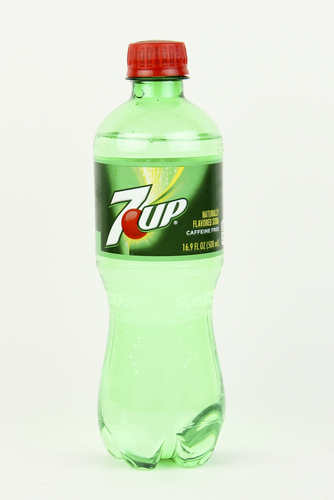Short answer
7 Up is a non-caffeinated soft drink that is loaded with high fructose corn syrup, has no mineral or vitamin content and no nutritional value.
Recommended Alternative
Long answer
7 Up is a popular non-caffeinated lemon-lime flavored beverage that was released in 1929. It initially contained the mood-stabilizing drug lithium citrate which was removed in 1948. 7 Up has been reformulated multiple times but it still has no nutritional value and contains several awful ingredients.
One of the main ingredients in 7 Up is high fructose corn syrup (HFCS). Although the FDA regards HFCS as safe there is substantial evidence linking it to the huge obesity issue - especially in the United States. At Princeton University, research validated that all sweeteners are not the same. Rat studies demonstrated that weight gain was significantly higher with ingestion of HFCS compared to table sugar even when the caloric intake was the same. Long-term ingestion of HFCS leads to an increase in visceral fat (intra-abdominal fat) that is linked to metabolic syndrome. Visceral fat is like a bowl of “toxic soup” that sits in the intra-abdominal area and is linked to high blood sugar, high blood pressure, high cholesterol and triglyceride levels and increase risk of cardiovascular disease. The obesity level, even in children has reached epidemic proportions in the United States and beverages like 7 Up are contributing to this.
Another detrimental additive in 7 Up is EDTA (Ethylenediaminetetraacetic Acid). Although deemed safe by the FDA, this chelating agent (which binds heavy metals in the system) has been linked to a plethora of health issues. EDTA is a chemical created from the combination of Formaldehyde, Sodium Cyanide, and Ethylene Diamine. This poison is added to many sodas, processed foods including sandwich spreads, salad dressings, sauces and numerous canned or pickled foods. The purpose is to increase shelf life by preventing rancidity, discoloration, and the separation of oils and fats.
EDTA has various side effects including depletion of important metals/vitamins, headaches, migraines, abdominal discomfort, nausea, vomiting, lightheadedness and fatigue. More troubling is the long-term risks of toxicity and kidney damage. An additional concern is attributed to the unknown side effects of the possible build up in the body over time. As a whole, people are using more artificially preserved items now than ever before in history. The collective overuse of many toxic and carcinogenic chemicals create a problem for researchers in ascertaining which destructive substances are responsible for specific long-term side effects.
There are many great alternatives to 7 Up. Organic juices are a wonderful substitute. And of course, water should always be part of everyone’s daily routine. 7 Up is a popular beverage but its consumption should be limited to avoid potential health side effects. The only “benefit” with 7 Up compared to many sodas is that it is caffeine free - outside of that it does not offer any nutritional value to the internal body.
Possible short-term side effects
- headaches/migraines
- abdominal discomfort
- nausea
- vomiting
- fatigue
Possible long-term side effects
- depletion of important metals/vitamins
- weight gain
- metabolic syndrome
- kidney failure
Ingredients to be aware of

Healthier alternatives
- organic juices
- water
Our Wellness Pick (what is this?)
Sprite Zero Sugar Soda
- Sugar-free refreshment
- Low-calorie drink
- Classic Sprite taste
- Convenient 12-pack
 Approved by
Approved by 















